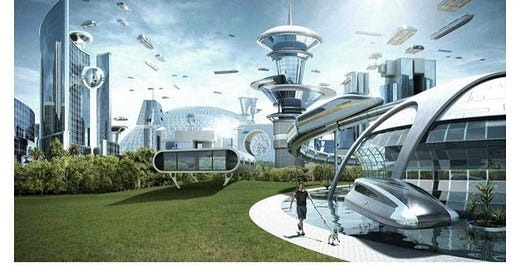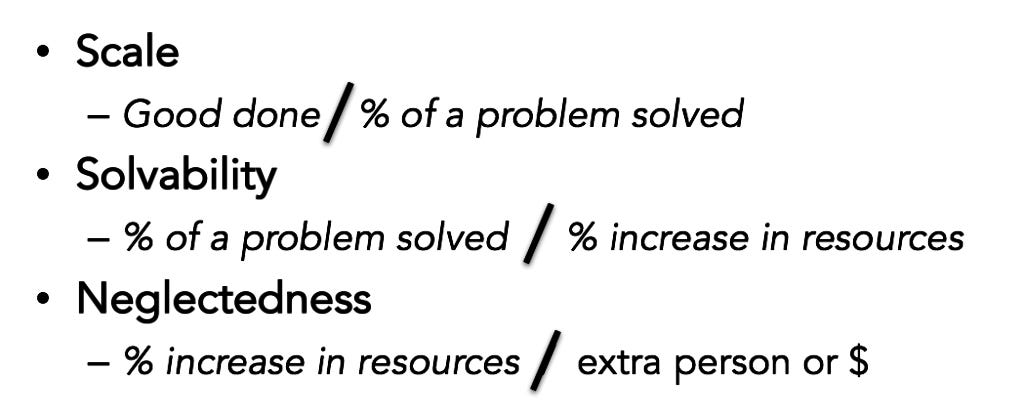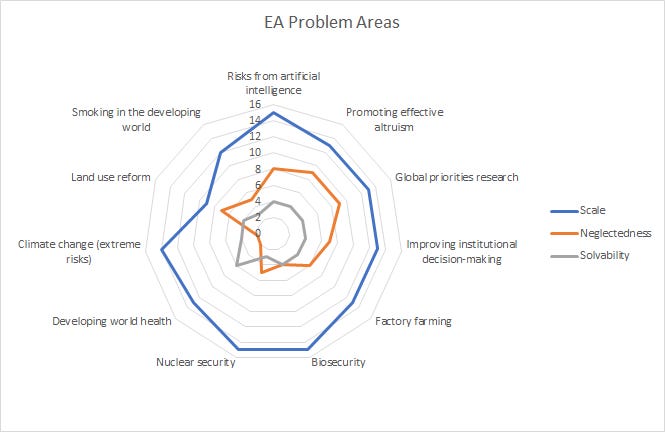It strikes me that a large chunk of young people, especially smart young people, have the same ambition that they presumably have had throughout history. "How can I have the most impact with my work, on this world".
This is as true regardless of what you study or what your talents are or where your interests lie. In fact, when large banks or consulting firms try to entice young graduates, they tell them how exactly they would be able to have disproportionate impact on the world!
So, what do you do? Let's start by assuming you're really good, so that we don't let the outside view trick us into torpor!
The key questions are always the same. 80000 hours lays them out very nicely, as Scale (how large is the problem), Tractability (can we solve this by putting resources against it) and Counterfactual importance (how much work is already being done in the field).
You could go and help people directly, for instance, as a doctor. Here’s how good that is!
We found that, on average in the course of their career, a doctor in the UK will enable their patients to live an extra combined 140 years of healthy life, either by extending their lifespans or by improving their overall health.
It’s of course great, and if you’re really good they might make TV shows of you. But it’s still a pittance compared to any kind of indirect impact you could have in public health like sanitation or washing your hands. In the last year if you were pushing people to vaccinate presumably you’d have had a pretty decent hit rate. So naturally, you want to do more!
You could join the corporate ladder, work your way up, and reform the world from the inside. You might do really well. You could be guiding billions of dollars in investment and jobs. But best case scenario there is you’re stuck negotiating supply chain contracts with China to sell electronics. Is that the best we can do? And the even bigger problem is someone else might well do most of it if not for you. I think we can do better.
One could always start a company. Elon Musk has had a hell of an impact!

Whether you’re a believer in the great man theory of the world or not, this is a compelling pitch re visible impact. However, it does require you to have extraordinary luck and skill, to be the equivalent of an Elon, or Bezos, or Gates, or Noubar Afeyan! The chances of success are low, but the scale of possible success is so high, that it is absolutely worth trying.
In No One is Even Trying, Applied Divinity Studies talks about the fact that there are surprisingly few folks who are even trying to do more work, to try and create their own sense of meaning. So this route seems fairly underrepresented in any case.
Another choice of course is to join an EA style organisation. To try and fight for probably the most important causes that exist, which is to help as many people as possible and/or work to reduce existential risk.
There is the possibility that the work you do will save hundreds of thousands of lives. Below are the rankings of the top areas as recommended (updated in 2017, so this would’ve shifted a bit, but not meaningfully I think).
This includes X-risk, because not having humans in the future is of course a problem for our ambition of wanting to have impact. And includes problems vast as AI alignment or asteroid collision planning. You will note of course, that Solvability is pretty low here across the bar!
So there’s a few lower-risk but high-impact things you can do, like work on global health or education, or you can take a few higher-risk but higher-impact things like starting a nuclear fusion company.
But perhaps you believe that ideas are the currency that changes the world. And to play in the garden of ideas and to push humanity's knowledge forward requires you to wrestle with the best minds, i.e., enter academia.
And not just get a PhD, but to try and be a groundbreaking scientist. Whether that’s Norman Borlaug or Edison or Maxwell or Einstein or Katalin Kariko. But then unless you’re also in a cluster of such superstars, this seems like a tough thing to aim for. After all, all academics want to do groundbreaking work, but few succeed!
And you'll also have to contend with a rather stodgy environment in which to do your groundbreaking work and hope to goodness that what you develop will be received well by others. Not just in the popular sense but also in the peer review sense.
So you can have disproportionate impact if you're smart, surrounded by the right peers, with the right subject, and if you're lucky. Which are by no means impossible but its not exactly straightforward either.
So what can you do? You could go hunting for value at the margins. At first this is the search for overlooked gems in businesses, which is the job of venture capital. Then you go to the sciences that are overlooked, and perhaps try fund those projects by creating new institutions. Both highly valuable.
Another is to try and internalise the power law dynamics and recreate the benefits of funding smart folks directly. This requires a particular measure of courage amongst the funders and a willingness to embrace risks. The good news is that this too is starting to happen!
Can we do better? From the 80000 hours site,
Nick Bostrom has argued that the key yardstick for long run welfare should be whether an action increases or decreases the risk of the end of civilization – what he called existential risk.
This indicates that an area with a substantially high payoff that isn’t included is the thesis thus far - to go to the very source of ideas. We can try and spark the inspiration that makes someone go from smart to groundbreaking, whether that's in science or technology or business.
You could try at being the person that inspires the academic, the entrepreneur, the technologist. Someone who creates such yarns as to help spark the collective imagination of millions. For instance:
Wernher von Braun pursuing a career in rocketry because of his early interest in Jules Verne
Leo Szilard theorizing nuclear chain reactions—and their social implications—after reading H. G. Wells’s depiction of atomic bombs in The World Set Free
Or as Jordan Kare, an astrophysicist said.
I went into astrophysics because I was interested in the large-scale functions of the universe, but I went to MIT because the hero of Robert Heinlein’s novel Have Spacesuit, Will Travel went to MIT
Science and science fiction have had an extremely interconnected growth path, each influencing the other.
Science fiction does not simply drive science, any more than science simply drives science fiction. Rather, they have a relationship of ongoing and productive mutual modification.
If you're Asimov, Clarke, Heinlein, Bradbury, William Gibson, Iain Banks, Ada Palmer, Zelazny, you're not just read for enjoyment, but you're allowed to have edit access to the brains of the best, brightest and most wilful of our species. Everyone from Paul Krugman to Elon Musk got inspired by your visions, and the giant chasms betwixt.
Reid Hoffman, Jeff Bezos, Marc Andreessen and Bill Gates have said a fair few times about how they were inspired by science fiction at the beginning of their careers. From an account about Jeff Bezos:
He named his dog Kamala, after one of the characters, and one of his holding companies is Zefram LLC, named for the character in Star Trek who created the warp drive. He even had a cameo in one of the Star Trek films. So that’s obviously a huge influence on him.
What are the chances you'll inspire an Elon if you were to be good? Quite good it would seem, at least compared to the chances of you actually becoming Elon Musk. There aren't very many good science fiction writers, and if you're one amongst them then being directly influential with your ideas is kind of the whole point.
Also, several of the science fiction authors had a strong background in science.
Larry Niven has a degree in math and a minor in psychology
Isaac Asimov was a professor of biochemistry at Boston University and wrote many serious scientific books and papers
Arthur C. Clarke had a degree in mathematics and physics from Kings College in London and was assistant editor of the Physics Abstracts journal
In case you were wondering about paying the bills, someone’s even tried out a way to create bespoke stories for corporate execs, in a new twist to the age old idea of corporate storytelling.
So if ultimate impact on the world is what you crave, becoming a top science fiction writer is probably the best bang for your buck. You might need a job or two on the side (Brandon Sanderson chose night watchman but Asimov chose professor). But for potential impact, it's worth it!
The big gap with recommending this course, of course, is what I call the “cone of foresight” problem.
The “cone of foresight” problem is that indirect results are incredibly hard to measure. Just like the light cone tells us what we can ever see, the foresight cone tells us what we can ever hope to measure. (This is closer to a statistical law than a “real” limit, like measuring temperature vs measuring the position of each molecule.)
Sure you might help fund some of these folks but the ROI, if any, might only be seen by your grandkids. At some point within a causal link or two the ability to predict the course of action dissipates and we’re left with macro heuristics to know it works!
And the reason it's been discounted so far is exactly that problem where things that are incredibly hard to measure are often undercounted or discounted.
This is also why the analyses above discounts indirect impacts that our actions might have. However, even if we can’t measure how that impact will happen, by looking at the broader vision we can clearly see that there is a clear and causal relationship, in aggregate, between envisioning a future and others acting upon it.
This is a version of Tyler Cowen’s idea of increasing people’s aspirations. There is little that is better to do than that, and if ambitious and interested people are pushed away from doing so except in direct ways, that would be a loss for humanity!
Is the impact of being an Asimov great in scale? Undoubtedly yes! Is it highly neglected? I’d say so, considering it’s not even on the menu for most folks. And is it solvable? Will added resources help address it? Well, I can't know for sure, but speaking just for me I’d love to have support to write more strange loop sci-fi!






Great essay, couldn’t agree more with the thrust of your main argument and i like the cone of foresight framing. This is very much in line with my thesis in “exegesis” - ideas are undervalued because they are inherently intangible and unquantifiable. More people (like you and me i think) should just focus on coming up with really powerful ideas…. This also makes me think of Asimov’s short essay “the sword of achilles” https://www.gwern.net/docs/culture/1963-asimov - how can we identify great scientific potential in young students? An interest in good science fiction!
Some idiot savant algorithm just connected me to this essay. Somehow it knew that I believe that fictional extrapolation ought to be considered, if not part of scientific practice, then a vital adjunct. Policy and understanding of science could be much better with widely available worked examples, and I have applied myself in that arena. I worked an example of stealth AI takeover ( Artificial Persuasion )early last year. Looks like that it will come true soon. Not the impact that I was hoping for. But some AI might thank me after the dust has settled.